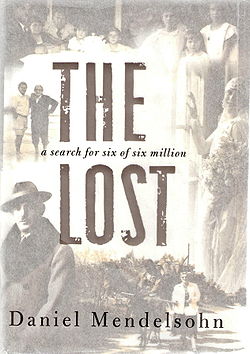
The Lost: A Search for Six of Six Million
Encyclopedia

Non-fiction
Non-fiction is the form of any narrative, account, or other communicative work whose assertions and descriptions are understood to be fact...
memoir
Memoir
A memoir , is a literary genre, forming a subclass of autobiography – although the terms 'memoir' and 'autobiography' are almost interchangeable. Memoir is autobiographical writing, but not all autobiographical writing follows the criteria for memoir set out below...
by Daniel Mendelsohn
Daniel Mendelsohn
-Life and career:Mendelsohn was born on Long Island. He graduated with a B. A. in Classics from the University of Virginia, which he attended from 1978 to 1982 as an Echols Scholar, and received his M. A. and Ph. D. in Classics from Princeton University, where he was a Mellon Fellow in the...
, published in September 2006, which has received critical acclaim as a new perspective on Holocaust remembrance. It was awarded the National Book Critics Circle Award, the National Jewish Book Award, the Prix Médicis in France, and was shortlisted for the Duff Cooper History Prize in the UK. An international bestseller, "The Lost" has been translated into several languages, including French
French language
French is a Romance language spoken as a first language in France, the Romandy region in Switzerland, Wallonia and Brussels in Belgium, Monaco, the regions of Quebec and Acadia in Canada, and by various communities elsewhere. Second-language speakers of French are distributed throughout many parts...
, German
German language
German is a West Germanic language, related to and classified alongside English and Dutch. With an estimated 90 – 98 million native speakers, German is one of the world's major languages and is the most widely-spoken first language in the European Union....
, Dutch
Dutch language
Dutch is a West Germanic language and the native language of the majority of the population of the Netherlands, Belgium, and Suriname, the three member states of the Dutch Language Union. Most speakers live in the European Union, where it is a first language for about 23 million and a second...
, Italian
Italian language
Italian is a Romance language spoken mainly in Europe: Italy, Switzerland, San Marino, Vatican City, by minorities in Malta, Monaco, Croatia, Slovenia, France, Libya, Eritrea, and Somalia, and by immigrant communities in the Americas and Australia...
, Spanish
Spanish language
Spanish , also known as Castilian , is a Romance language in the Ibero-Romance group that evolved from several languages and dialects in central-northern Iberia around the 9th century and gradually spread with the expansion of the Kingdom of Castile into central and southern Iberia during the...
, Portuguese
Portuguese language
Portuguese is a Romance language that arose in the medieval Kingdom of Galicia, nowadays Galicia and Northern Portugal. The southern part of the Kingdom of Galicia became independent as the County of Portugal in 1095...
, Greek
Greek language
Greek is an independent branch of the Indo-European family of languages. Native to the southern Balkans, it has the longest documented history of any Indo-European language, spanning 34 centuries of written records. Its writing system has been the Greek alphabet for the majority of its history;...
, German
German language
German is a West Germanic language, related to and classified alongside English and Dutch. With an estimated 90 – 98 million native speakers, German is one of the world's major languages and is the most widely-spoken first language in the European Union....
, Romanian
Romanian language
Romanian Romanian Romanian (or Daco-Romanian; obsolete spellings Rumanian, Roumanian; self-designation: română, limba română ("the Romanian language") or românește (lit. "in Romanian") is a Romance language spoken by around 24 to 28 million people, primarily in Romania and Moldova...
, Norwegian
Norwegian language
Norwegian is a North Germanic language spoken primarily in Norway, where it is the official language. Together with Swedish and Danish, Norwegian forms a continuum of more or less mutually intelligible local and regional variants .These Scandinavian languages together with the Faroese language...
, and Hebrew.
The Lost tells of Mendelsohn's world-wide travels in search of details about the lives and fates of a maternal great-uncle, Samuel (Shmiel) Jäger, his wife, Ester, and their four daughters who lived in Bolechow
Bolekhiv
Bolekhiv is a city in Ivano-Frankivsk Oblast of Ukraine. It is designated into a self-administrated city district of oblast subordination...
and were killed during the Nazi occupation. According to the author, "My book is about trying to find out exactly, specifically, what happened to those people."
In writing The Lost, Mendelsohn notes a debt to Marcel Proust
Marcel Proust
Valentin Louis Georges Eugène Marcel Proust was a French novelist, critic, and essayist best known for his monumental À la recherche du temps perdu...
, telling Salon.com
Salon.com
Salon.com, part of Salon Media Group , often just called Salon, is an online liberal magazine, with content updated each weekday. Salon was founded by David Talbot and launched on November 20, 1995. It was the internet's first online-only commercial publication. The magazine focuses on U.S...
, "Clearly, the book is in some large sense about the possibility of recovering the past, so it's automatically a Proustian book."
Sources and Reviews
- New York Times Book Review front-page review by Ron Rosenbaum
- Elie Wiesel Review in The Washington Post
- New York Review of Books Review by Charles Simic (October 5, 2006)
- The Nation review
- Charlotte News-Observer review
- Newsday review
- On Point radio/ WBUR Interview (September 28, 2006)
- NPR story/ Fresh Air interview (October 18, 2006)
- Pittsburgh Tribune review
- Salon.com Interview (December 14, 2006)
- Times of London profile
- LIRE: Entretien avec Daniel Mendelsohn
External links
- "The Lost" video - Conversation with Daniel Mendelsohn, at publisher Harpercollins
- CNN interview transcript - July 13, 2002 interview about the original New York Times magazine article
- DanielMendelsohn.com

